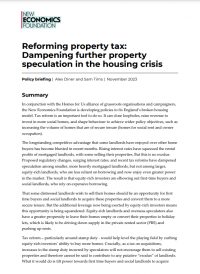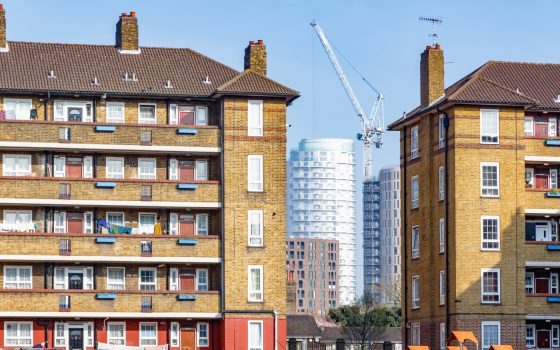Reforming property tax
Dampening further property speculation in the housing crisis
23 November 2023
In conjunction with the Homes for Us alliance of grassroots organisations and campaigners, the New Economics Foundation is developing policies to fix England’s broken housing model. Tax reform is an important tool to do so. It can close loopholes, raise revenue to invest in more social homes, and shape behaviour to achieve wider policy objectives, such as increasing the volume of homes that are of secure tenure (homes for social rent and owner occupation).
The longstanding competitive advantage that some landlords have enjoyed over other home buyers has become blunted in recent months. Rising interest rates have squeezed the rental profits of mortgaged landlords, with some selling their properties. But this is no exodus. Proposed regulatory changes, surging interest rates, and recent tax reforms have dampened speculation among smaller, more heavily mortgaged landlords, but not among larger, equity-rich landlords, who are less reliant on borrowing and now enjoy even greater power in the market. The result is that equity-rich investors are elbowing out first-time buyers and social landlords, who rely on expensive borrowing.
That some distressed landlords wish to sell their homes should be an opportunity for first time buyers and social landlords to acquire these properties and convert them to a more secure tenure. But the additional leverage now being exerted by equity-rich investors means this opportunity is being squandered. Equity-rich landlords and overseas speculators also have a greater propensity to leave their homes empty or convert their properties to holiday lets, which is likely to be driving down supply in the private rented sector (PRS) and pushing up rents.
Tax reform – particularly around stamp duty — would help level the playing field by curbing equity-rich investors’ ability to buy more homes. Crucially, as a tax on acquisitions, increases to the stamp duty incurred by speculators will not encourage them to sell existing properties and therefore cannot be said to contribute to any putative “exodus” of landlords. What it would do is tilt power towards first time buyers and social landlords to acquire these properties and convert these homes to a more secure tenure. Depending on the increases implemented and the extent to which the number of transactions were impacted, these reforms could also raise an additional £3.4-£5.7bn in 2024/25. This could potentially more than treble the size of government expenditure on social and affordable house building, enough to deliver grant funding for an additional 18,600 – 31,100 new social homes.
Campaigns Homes For Us
Topics Housing & land







